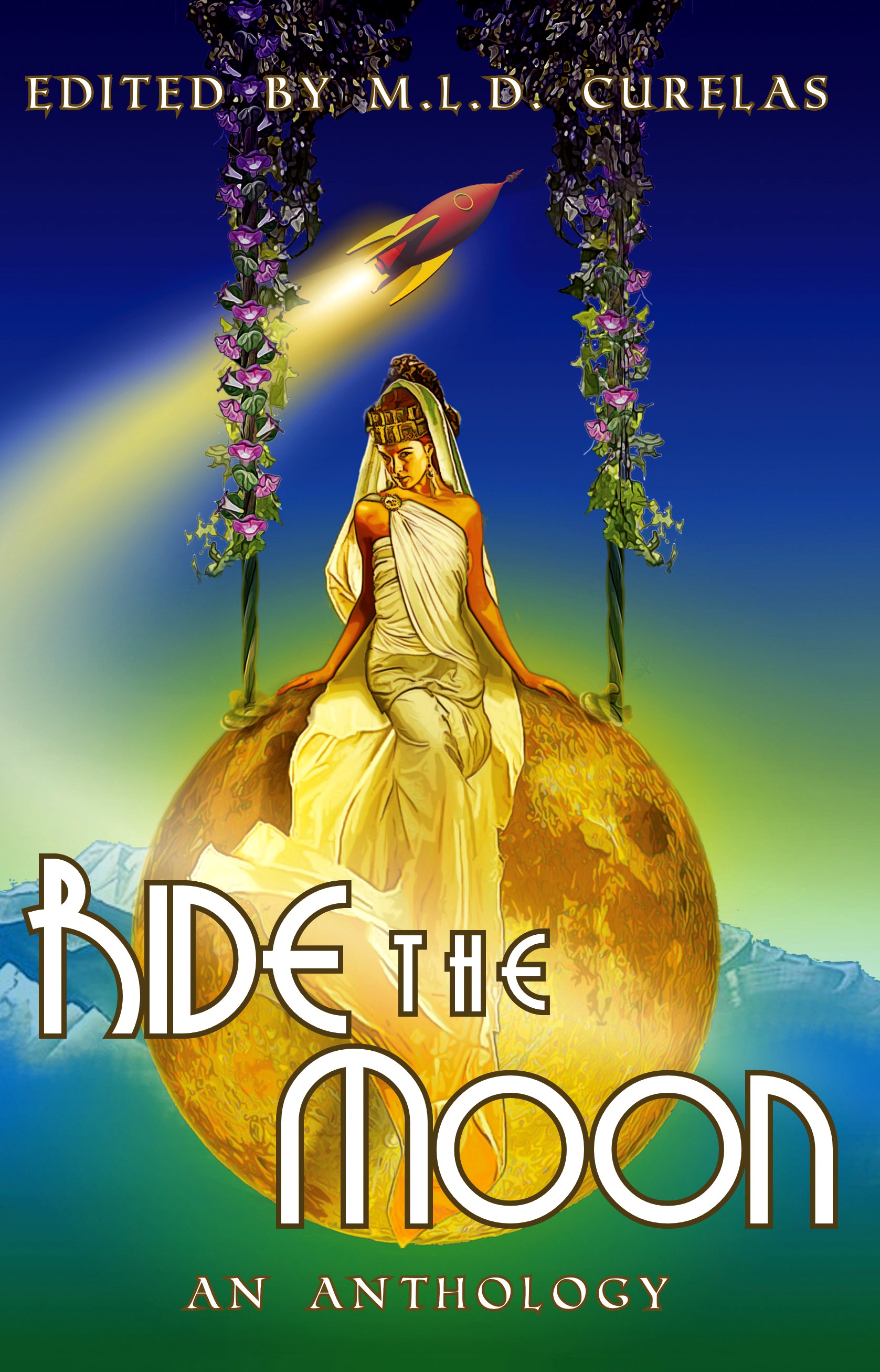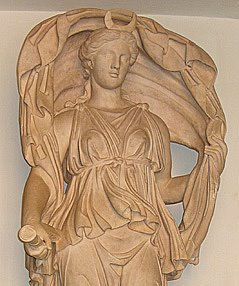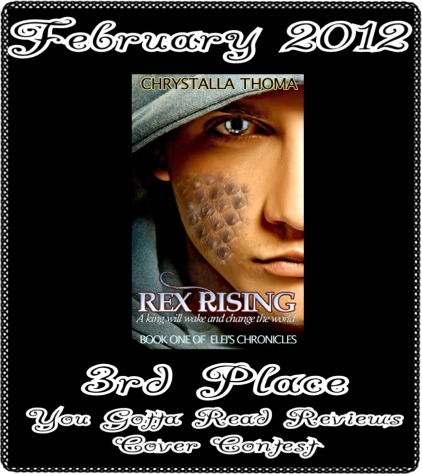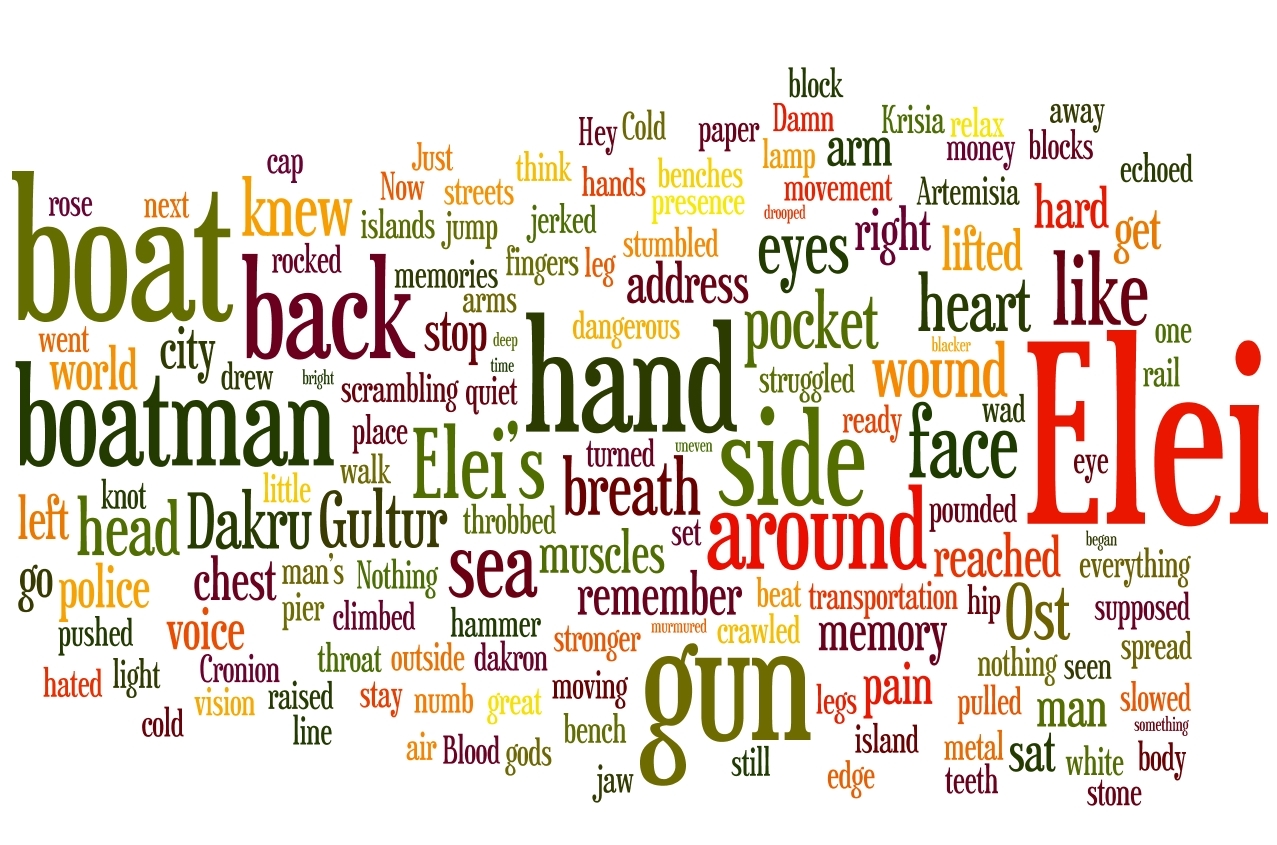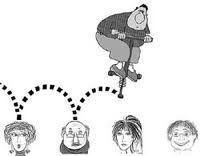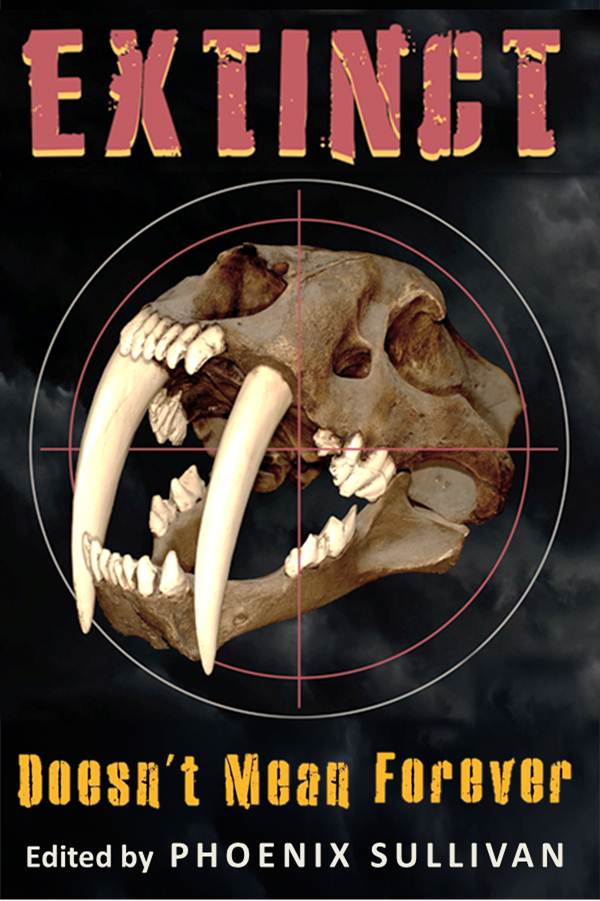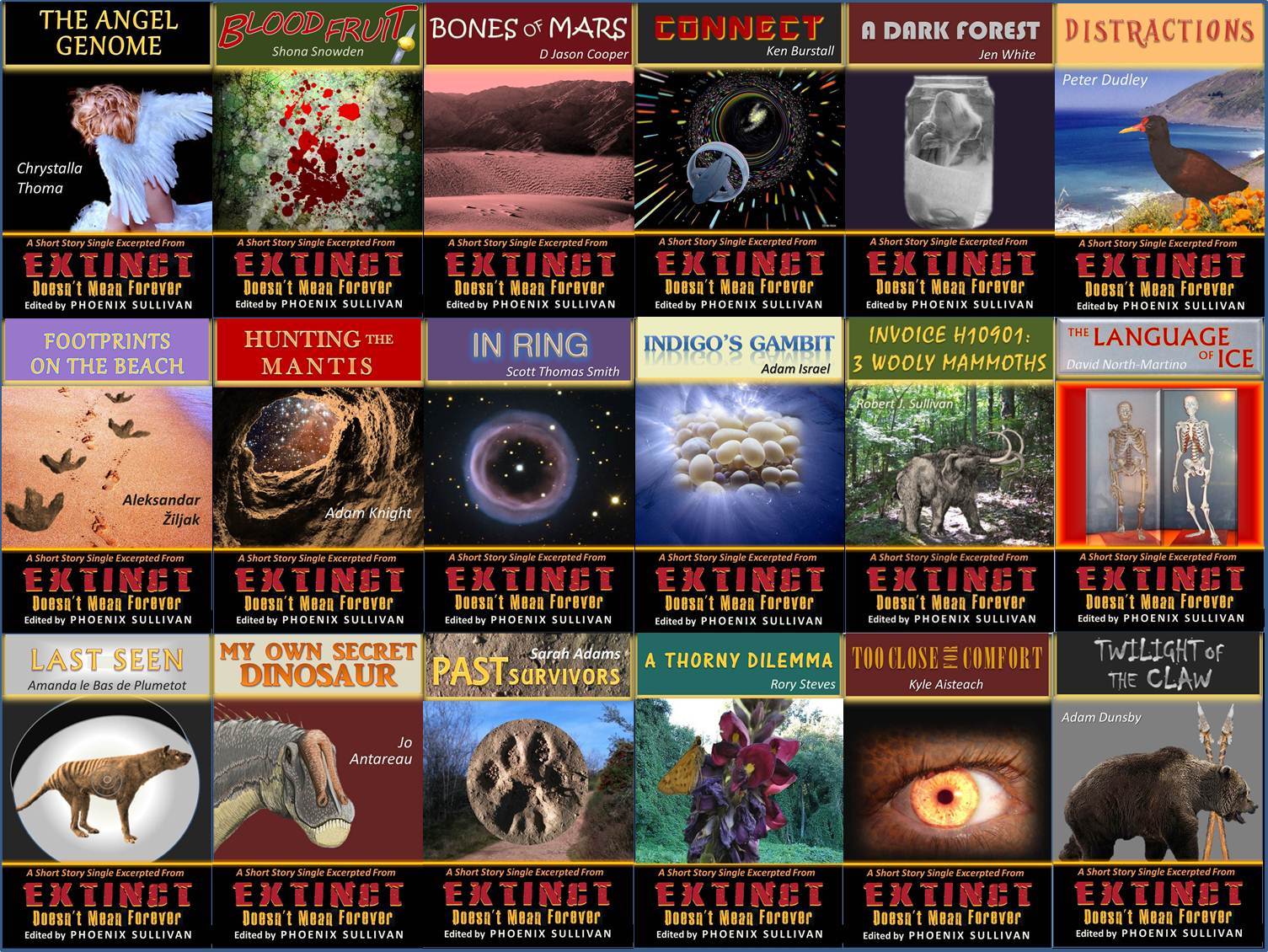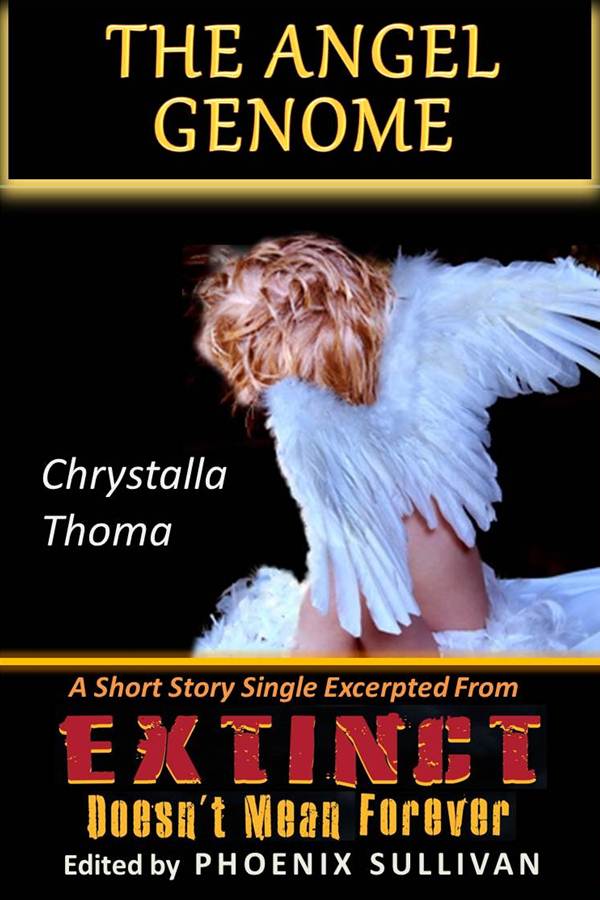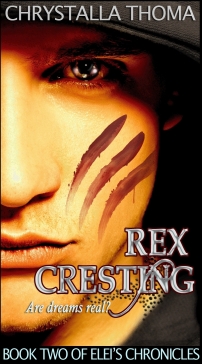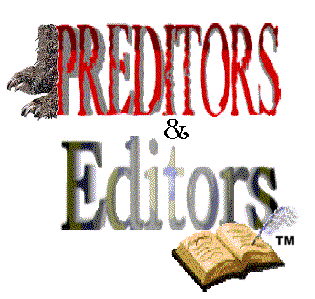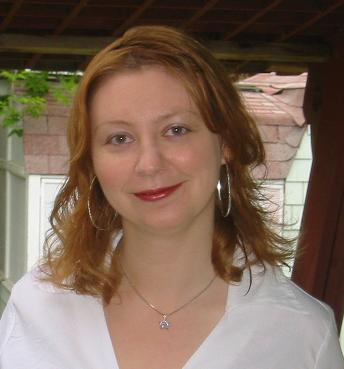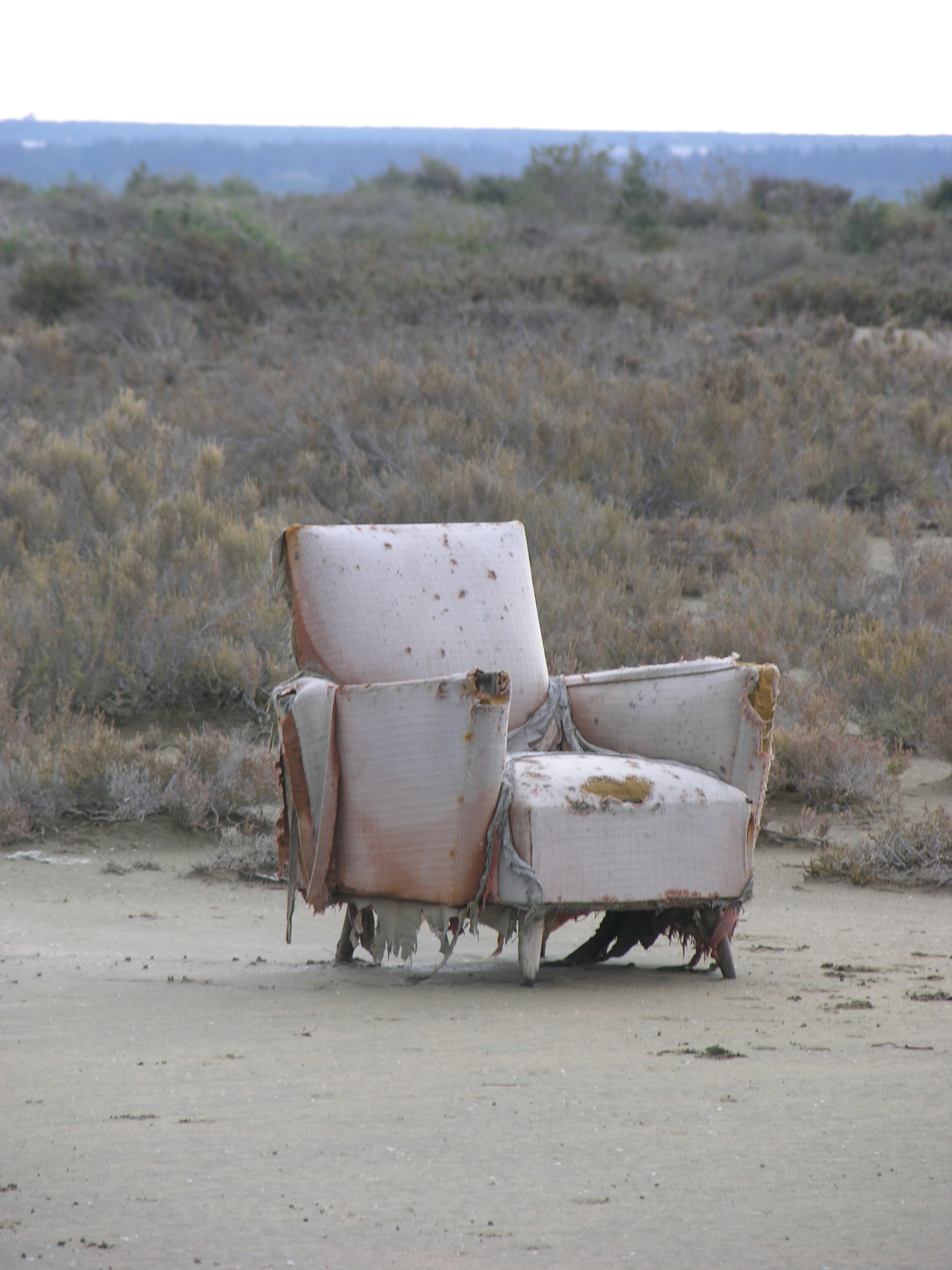Guest interview with author Katherine Hawkings
Chrys: Hi and welcome to my blog! Why don’t you tell us a few words about yourself first?
Katherine: A few words about myself? Does the fact I was sorely tempted to quote Dumbledore just now tell you anything? I’m a Kiwi girl, currently living in England. I love chocolate, playing ice hockey, snakes and kittens but I hate sand sticking to my skin, asparagus and spiders.
Chrys: HP fans, woohoo! 😀 What genre(s) do you write and why?
Katherine: I primarily write young adult books, but the genres vary widely. At the moment I have a sci-fi, fantasy, paranormal romance and a historical romance in the works. I guess it’s probably influenced by what I’ve read in the past and various interests of my own. I prefer young adult because I quite like writin gin the first person, and I find the stories flow a lot faster too.
Chrys: Tell us about your latest release!
Katherine: My latest release is also my first. It is called The Sphinx Project and is the first in The Chimaera Chronicles. The story features a genetically modified girl called Michaela and her friends as they escape the labs in which they were created. It’s got a lot of action and is quite fast moving.
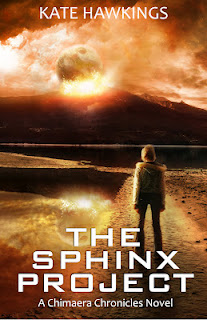 Not many people can say their entire existence has been one big lab experiment: poked and prodded by scientists, genetically modified to be the best and endure the worst, subjected to daily tests and trials that would kill a normal human. All Michaela wants is her own life, to be able to go to school, flirt with boys, maybe eat ice cream now and then. So when the chance to escape finally comes, Michaela and her sister grab it, taking their friends with them.
Not many people can say their entire existence has been one big lab experiment: poked and prodded by scientists, genetically modified to be the best and endure the worst, subjected to daily tests and trials that would kill a normal human. All Michaela wants is her own life, to be able to go to school, flirt with boys, maybe eat ice cream now and then. So when the chance to escape finally comes, Michaela and her sister grab it, taking their friends with them.
But they weren’t the only ones to find their way out of those labs. Following close behind are another breed of creature, one that doesn’t know the difference between right and wrong, who exist only to feed their own hunger. The appearance of a strange boy who seems too much like them to be a coincidence makes things even more confusing. But as the world begins to literally fall apart around them, Michaela must accept his help, especially when she could lose the very thing she holds dearest: her sister.
Chrys: If you weren’t a writer, what would you be?
Katherine: I like to think I’d be an actress, but the whole stage-fright thing would probably stop that idea in it’s tracks. There are so many things I’d like to do with myself, I don’t know which one I would pick. At university I studied sport science and nutrition, so I could have followed that path, but I’m also tempted by film-making, marketing and event management.
Chrys: What gave you the idea for this book?
Katherine: I’ve always been interested in people with special abilities, and a while back I read several articles British legislation regarding the creation and disposal of hybrid creatures. It clicked really well with a scene I’d written and it ended up evolving into The Sphinx Project,
Chrys: Do you have a favorite scene in the book?
Katherine: I would have to say my favourite scene is when Michaela first meets Matt, but if I told you any more I’d ruin it for you.
Chrys: What kind of research did you do for this story?
Katherine: Like I said there was the newspapers, but most of the research was actually scoping out specific locations. The story is set in America, and although I’ve visited one of the locations from the book before the others were a complete mystery to me.
Chrys: Where can people learn more about you and your writing?
Katherine: My blog is probably the best place: http://katherinehawkings.blogspot.com/
Links:
Purchase links:
Amazon US
A new anthology is launched – “Ride The Moon”
The moon is sun’s competitor and it controls the tides of our fortunes. The moon is mysterious and it hunts in the night among the stars. Male or female or androgynous – one does not know – it possesses great powers and it rules those who prefer the dark.
The ancient Greeks called the moon “Selene” (or Selana, depending on the dialect), probably from the word “selas”, ancient word for “light”. For the moon is bright and lights up the night. Her symbol is the crescent moon (she wears it on her head like Diana with whom she’s often identified, and like Isis).
For this anthology, the lovely people at Tyche Press decided to go beyond the usual and common themes associated nowadays with the moon (vampires, werewolves and man men running naked in the streets…) So they asked for something different.
What came out of this effort is beautiful and strange, and as crazy as the 19 amazing authors participating (well, I’m crazy, can’t really say about the others, some of whom are very well known Canadian authors…)
Who they are? Here is the list:
- Krista D. Ball, On the Labrador Shore, She Waits
- Marie Bilodeau, The Buried Moon
- Kevin Cockle, Dowser
- David L. Craddock, Shara’s Path
- Theresa Crater, White Moon
- Isabella Drzemczewska Hodson, Husks
- Ada Hoffmann, Moon Laws, Dream Laws
- Claude Lalumiere, The Secondary 4 Class of Prettygood Park High School
- C.A. Lang, Tidal Tantrums
- Amy Laurens, Cherry Blossoms
- Billie Milholland, Small Seven’s Secret
- Tony Noland, Sunset at the Sea of Fertility
- Jay Raven, Bitter Harvest
- A. Merc Rustad, With the Sun and the Moon in His Eyes
- Rebecca M. Senese, Moon Dream
- Lori Strongin, A Moonrise in Seven Hours
- Chrystalla Thoma, The Black Mermaid and the Moon
- Shereen Vedam, Aloha Moon
- Edward Willett, Je Me Souviens
Where to find the book?
On the official Tyche Press site
My story is called “The Black Mermaid and the Moon” and here is how it begins:
Semor surveyed the quiet streets, his heart thumping against his ribs. Everyone with a bit of sense would stay indoors tonight. It was a full moon, a dangerous and ill-omened time when everyone and everything showed their true face.
But if he turned back now, his life was forfeit, and he’d never see Adelia again.
He stalked the narrow streets of the town, stacked high with stone buildings, crowded by whispering trees. The moon silvered the cobbles and gave the foliage voice. A bird flapped down from a roof and he pressed himself to the shadow of a doorway as it writhed and grew, scales forming on its legs and curled claws and it screamed, taking off, black against the moon.
The black mermaid, the sea goddess, lived off these shores, in the haunted waters of the bay. While traveling around the world, seeking answers, he’d heard rumors that she collected the souls the currents of the world brought her; that she kept them in oyster shells and clams and nursed them.
Semor didn’t believe in gods or fate, but in desperate times one did desperate things.
Unlike other creatures, the black mermaid did not transform, and did not exist at any other time; it was the full moon that brought her to life, carved her out of water and darkness.
So here Semor stood, mercenary fighter and faithless man, in search of his lost soul.
Rex Rising takes 3rd position in cover contest
Hi guys. Sorry I disappeared again (my usual vanishing act), but I’ve had so much work it’s ridiculous – between freelance translation jobs, cleaning a family apartment for rent and trying to edit my novel.
But I thought to pop in and let you know that I had entered Rex Rising in a cover contest over at the You Gotta Read Reviews blog, and it got the 3rd position! 🙂
Now, it may not sound like much – but it gets the book exposure through the announcement and it will get a month of free advertising in their sidebar!
Besides, I’m absurdly proud because I’m also the cover artist for this one (not so for the winners of the first two places, where the author and cover artist are two different persons).
So… yeah. Happy. 🙂
Here is the link: Cover Contest
And here is my official badge:
Have a great day everyone!!!
Interview with guest author J.A. Beard
Today I have the pleasure to have as my guest author J.A. Beard who has just released his YA paranormal novel THE EMERALD CITY, while he’s soon to release a regency paranormal romance and a fantasy novel.
Chrys: Hi J.A. and welcome to my blog! Why don’t you tell us a few words about yourself first?
J.A.: Hello, I’m J.A. Beard. I like to describe myself as a restless soul married to an equally restless soul. My two children are too young yet to discuss whether or not they are restless souls, but I’m betting on it. I like to call myself the Pie Master, yet I’m too cowardly to prove my skills in an actual baking competition. So, really, I’m merely a Potential Pie Master.
Chrys: Pies are heavenly, so I hope you get to baking soon and send me one (albeit a virtual one)! As for writing, I see you already have passed the “potential” stage and are now a published author. What genre(s) do you write and why?
J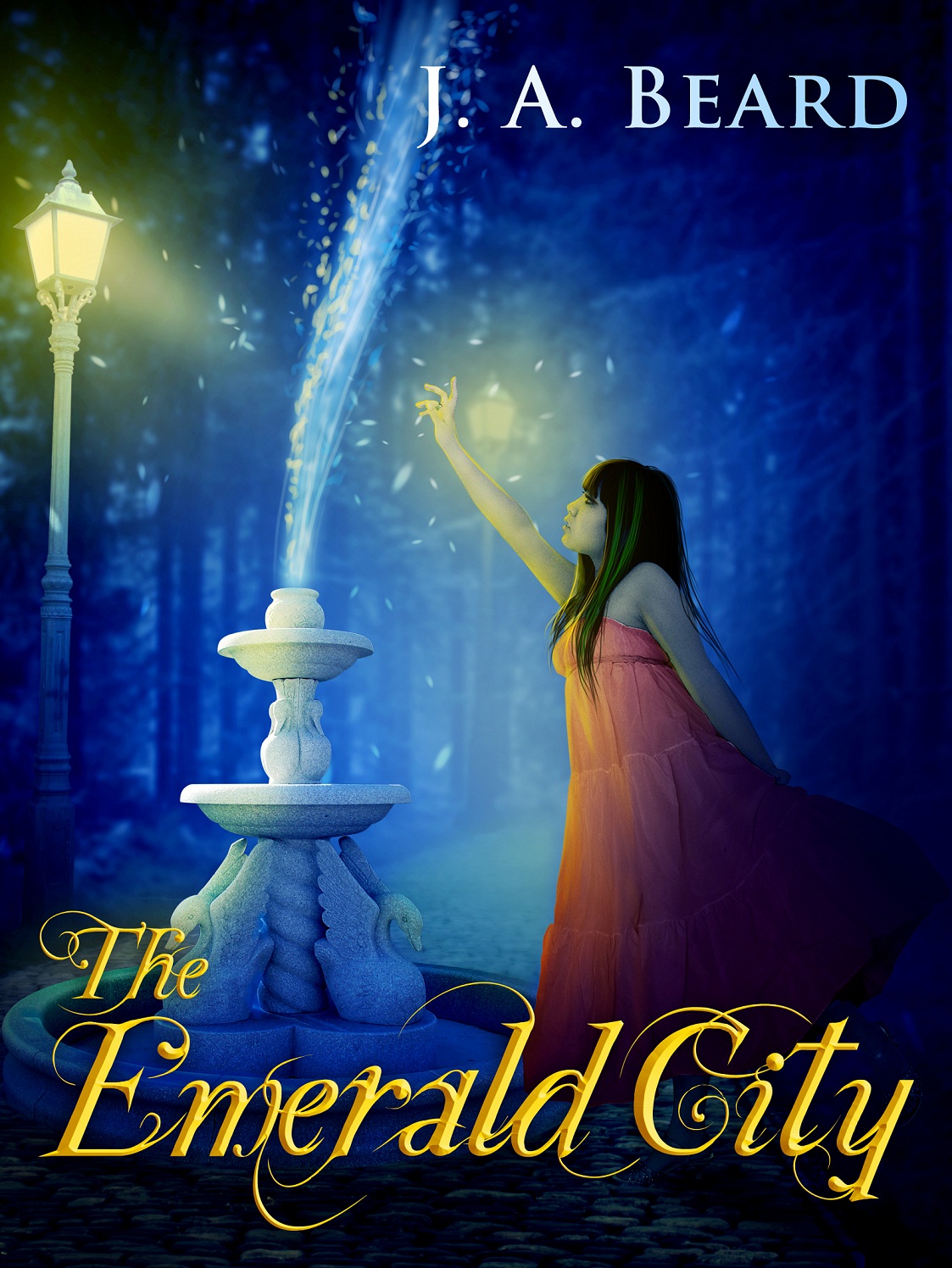 .A.: I actually like to dabble in many genres, but my manuscript focus in recent years has been on fantasy, paranormal, historical fiction, and combinations of those.
.A.: I actually like to dabble in many genres, but my manuscript focus in recent years has been on fantasy, paranormal, historical fiction, and combinations of those.
Fantasy and paranormal works appeal to me because, outside the writing context, I’m a very skeptical sort. I don’t believe in magic, psychic powers, or anything like that. I sometimes joke that the only magic I believe in is the magic of compound interest (I forget where I first heard that joke). It’s terrific fun for me to imagine worlds where those sorts of abilities exist and influence people—a nice bit of escapism.
That being said, the addition of supernatural abilities and aspects to a story allows a sort of philosophical and sociological exploration as well. You get to start asking questions about how people would react if they had certain abilities or how a society would be different, for example, if a medieval government had professional telepaths. What impact would the mass creation of magical automatons have on a rural slave-owning society? Would a modern American high school student abuse special powers? Why or why not?
The interesting thing is that when you start asking these questions, the answers can suggest a lot about human nature (or at least a particular perception of it). So fantasy and paranormal works, while being fun on a purely escapist level, also help me explore my thoughts on human nature.
My love of historical fiction flows naturally from my love of history. I’ll never have a time machine to visit and interact with the past, so the closest I can get to time travel is directly engaging the past via the creation of historical fiction. Although I’ve always been interested in history, it’s not until I started working on historical fiction that I really became engaged with the day-to-day lives of people in the past.
Chrys: I’ve always wished for a time travelling bubble (although personally I wouldn’t like to step out of my bubble, just observe…) What can you tell us about your writing projects and recent releases?
J.A.: I just released my debut novel, a young adult urban fantasy, THE EMERALD CITY.
With the aid of my editor, I’m finishing up edits on two other projects scheduled for release in February and March respectively, A WOMAN OF PROPER ACCOMPLISHMENTS and MIND CRAFTER.
A WOMAN OF PROPER ACCOMPLISHMENTS is a slightly alt-history (sorry Americans, we lost the Revolution in this timeline) sweet Regency paranormal romance.
MIND CRAFTER is a fantasy story focused around a young telepath who gets drawn into a dangerous conspiracy involving a religious cult.
Though I’m also working on the sequels to the above, I’m also working on a historical thriller planned for release in the fall. This story will be set in Heian era of Japanese history.
I’m “cheating” a bit in that I have several novels I’m releasing this year, but most of those manuscripts were completed previously and were just in need of some editing.
Chrys: They sound like very exciting projects. Tell us about your latest release?
J.A.: THE EMERALD CITY is a loose modern YA urban fantasy re-imagining of the Wizard of Oz. Kansas teen Gail Dorjee has tried to escape from the pain of her parents’ death by retreating into a hard shell of anger and sarcasm. When her aunt and uncle ship her off to an elite Seattle boarding school, Osland Academy, she spends her first day making enemies, including the school’s most powerful clique, the Winged, and their leader, the ruthless Diana.
Social war and the school’s uptight teachers are only mild annoyances. Mysterious phone outages, bizarre behavioral blocks, and strange incidents suggest Osland is focused on something much more sinister than education.
Now Gail has to survive at the school with a pretty pathetic assortment of potential allies: her airhead roommate, Lydia, and, Leandra, a cowardly victim of the Winged. There’s also the small matter of the handsome but cold Nick, a boy who seems interested in Gail. He just happens also to be Diana’s boyfriend.
Chrys: Echoes of Oz. Interesting! Anything else you drew inspiration from for this book?
J.A.: I like musicals. A couple years back, the Broadway touring production of Wicked rolled into town. Now, for those unfamiliar with it, it’s an adaptation of a book by Gregory Maguire. His story is a revisionist retelling of the WONDERFUL WIZARD OF OZ from the point of view of the Wicked Witch of the West. Although it adds some details and changes character perceptions, it’s still firmly set in L. Frank Baum’s Oz.
After watching Wicked, I became inspired. I wanted to write some sort of Oz story, but writing something directly set in Oz didn’t really appeal to me. I’d been on a reading streak of YA paranormal/urban fantasies at the time, so the idea of adapting Oz to a more modern YA setting seemed like a good plan. After all, Dorothy wasn’t an adult when she traveled to Oz.
I’m originally from the Pacific Northwest, so I immediately thought of setting the story in Seattle, which has had the nickname “The Emerald City” for a while now.
Given that my immediate inspiration for this story was a musical, some of that also made it in. Obviously, I don’t have a sound track or anything, but a character with a beautiful singing voice plays a key role in the plot.
Chrys: There are many versions of The Wizard of Oz and lots of YA fantasy around. What is special about this book – what sets it apart?
J.A.: Well, it does seem like there’s a dearth of English-language YA urban fantasy/paranormal books out there focused on Asian-American protagonists. The main character in the story, Gail Dorjee, is a second generation Tibetan-American. Although she’s rather thoroughly Americanized in terms of culture, that ethnic identity allowed me to play around a bit with some Buddhist thoughts as Gail confronts her various trials and travails.
I thought it was an interesting way to build the character and her psychology. It’s also fun because Gail’s like any other American teen, there’s a tension in the way she was raised and the way she wants to behave. Ironically, Gail wasn’t originally going to even have that sort of ethnic background.
I’d read about a controversy concerning a cover update for Cindy Pon’s Asian historical fantasy novel, THE SILVER PHOENIX. I won’t rehash the controversy in detail here, but the summary version is that a newer cover seemed designed to strip out some of the ethnic elements of a story that was actually set in an explicitly Asian setting. There was some suggestion that this was to appeal to book buyers (at the wholesale level, not the individual reader level) who may be leery of a book with an Asian protagonist. The newer cover, unfortunately, also has the added problem of being boring.
I thought that was a shame if true, and it started me thinking about YA books and diversity. I’m African-American, and to the best of my knowledge there are zero Asians or Asian-Americans of any sort in my family tree. So it’s not like I have a particular personal ethnic axe to grind.
The original WONDERFUL WIZARD OF OZ was a quintessentially American tale. Mr. Baum wanted to make an “American” fairy tale. I thought a lot about how America is different in the 21st-century than it was in Mr. Baum’s day. We’re obviously a lot more ethnically diverse and even religiously diverse. I thought it’d be fun to have a character that American teens could identify with as someone who still very obviously a product of American society, but still highlighted that modern diversity in a hopefully non-stereotypical way.
In the end, I’m rather glad I did it. In the end, building the character the way I did really ended up enhancing the story in a way I wouldn’t have predicted.
Chrys: It sounds wonderful. Do you have a favorite scene in the book?
J.A.: That’s hard to say. There are many scenes I love.
There are some great scenes near the end of the book where Gail’s forced to confront head-on her grief over her parents in a way I hope comes across as powerful yet vulnerable. In the end, this is a story about a teen girl already dealing with something horrible, the death of her parents, and being further pounded into the ground by both standard-issue high school garbage and spooky supernatural happenings. She’s a strong-willed girl, but I tried hard to make sure her emotional wounds weren’t brushed aside just by the needs of the plot. I wanted a likable pro-active girl who still, like many people, young or old, has emotional wounds she has to deal with.
In contrast, my other favorite scenes involve Gail’s roommate, Lydia. She’s the Scarecrow analog. The other students call her “Brainless” and she’s a notorious airhead. At the same time, she can always put a positive spin on things and has some great one-liners.
Chrys: What kind of research did you do for this story?
J.A.: Not much really, particularly compared to my fantasy and certainly compared to my historical fiction WIPs. I had to research Tibetan myths a bit, but that’s about it. The story is set in modern times in a region I’m familiar with. The only thing I double-checked on a lot was what elements were in the original WONDERFUL WIZARD OF OZ versus the movie. The former is in public domain whereas the latter is not. I definitely don’t want to step on anyone’s intellectual property toes.
Chrys: Heh, I can imagine! Tell us, if you weren’t a writer, what would you be?
J.A.: Well, I’ve tried my hand at several professions, but currently I’m working on my PhD in microbiology. I do love science, but I think I love writing more. Fortunately, for now at least, I’m able to do both.
Chrys: It’s really odd to me that you don’t write science fiction (or at least not planning on releasing any this year) although you have such sound foundations in science – but maybe it has to do with the escapism you mentioned (which I can understand very well…)
A different question: what person or person(s) has/have helped you the most in your career?
J.A.: My wife, Bethany. She has been encouraging when I needed it, but also critical when I needed it. She’s a freelance editor, so hasn’t been afraid to tell me when my stories needed work.
It is a bit awkward, though, when your wife reads through a manuscript and declares, “This ending is terrible!”
Chrys: Lol!Thanks for telling us so much about your writing and your stories, and good luck! One last thing: Where can people learn more about you and your writing?
J.A.: jabeard.com
I’m also on the net at:
THE EMERALD CITY purchase links:
Random Writing Rants Blog Hop – and a Rant about Hopping
When you are in the process of choosing a book to buy, after being drawn in by a beautiful cover and a snappy summary. do you check the first pages to see what the writing is like? Do you hope the voice of the narrative will grab you and not let go? Do you wish for a story and characters to make you forget about your everyday life?
Do you get disappointed from time to time, close the book and start your search anew? And do you know why you were disappointed, why the writing and the story let you down?
Who better to talk about such moments, such issues, than writers. Writers can not only identify the problem in a story, be it the characters, the flow, the choice of words, the narrator’s voice and other issues, they can also offer solutions.
Therefore for all of you who are interested readers and writers, 7 authors have organized a small blog hop – one week – to rant about issues in writing and their ideas and solutions.
As for myself, I have a small list of writing rants, some of which will be discussed by the participating writers, such as the lack of a distinctive narrator’s voice, crowds of main characters who each get their own point of view, annoying heroines who keep screaming and slapping people, stereotypical plots, wooden writing with lots of telling, lack of different voices in dialogue, heroes who seem to be doing nothing for pages, descriptions of clothes and furniture that go on and on…
But let’s face it, we each have a pet peeve, something that annoys us so much we throw the book against the wall (or in the case of ebooks, click to close the document with unneeded force…).
Mine is what is often called “head hopping“.
“Do you hop from head to head?”
What it means is this: while James is the one telling his story from his point of view of the events, and we’re seeing everything through his eyes, suddenly we hop into Anna’s head and we know what she’s thinking and can see how James’ blue eyes narrow at her. Then in the next paragraph/sentence, we hop back into James’ head and learn that he likes Anna a lot and she looks pretty with her hair up like that. And then we hop into his mother’s head and then his brother’s and then the dog’s and then his puppies’!
Let’s be clear, this isn’t a rant about the amount of characters having their say in the story (that’s another rant, and I itch to say that more than 4-5 characters, people, that’s a lot already) but let’s stick to this: head hopping. The slip can seem easy and to the inexperienced writer it is. You can often find signs of it in the first page, the first paragraphs when the main character is doing this and that and rubs his “beautiful brown eyes” or purses his “fine, shapely lips”. Not omniscient, not by choice: by mistake.
If I find signs of head hopping in the first pages of a story, then I close the document and go in search of an author who has studied her/his craft and really has taken the time to learn how to write.
I wish you all a very nice day, and make sure to follow the schedule, to see what the other authors have to say about writing:
9 Febr: A. Merc Rustad – On Voice
10 Febr: Marie Dees – Building a Novel from Nothing
11 Febr: Krista D. Ball – Avoiding the Heroine Stupid Juice
12 Febr: Marion Sipe – Rant on Stereotypes, Cliches and Tropes
13 Febr: Ada Hoffmann – On Blundering
14 Febr: Amy Laurens – When Less is More
My Minotaur and other news
Some months ago (okay, perhaps more than half a year ago) I posted some excerpts from an urban fantasy novella I was writing about Theseus and the Minotaur. Yeah, so I have a fascination with Greek mythology.
Hey, I’m Greek (Cypriot). There’s no escaping that fact, and I guess it’s true that you often write about things you know well and have been raised with (though not only…)
Well, my novella, called (gasp!) “The Minotaur”, has been accepted for publication with MuseItUp Publishing! 🙂
That’s the Canadian publisher who also released my UF novella Dioscuri. That’s not a coincidence, since The Minotaur takes place in the same alternative world as Dioscuri – a world where the mortals have by mistake woken up the ancient Greek gods. A Resistance group is barricaded in the secret passages inside the Acropolis Hill in Athens, and squadrons are sent out to battle monsters as they emerge from the underground and the construction sites where the mortals have unwittingly broken through the gods’ slumber…
This novella takes up again the theme of brothers struggling against mortal and divine parents and their fate.
The idea is to have a trilogy of siblings-from-mythology novellas, probably closing the cycle with a tale of sisters instead of brothers – possibly Andromeda and Medusa (and Perseus…)
In other news:
I have submitted a proposal to write a (non fiction) book about dragons, and although I don’t hold a contract yet, it looks like it’s going to happen. 🙂 I will announce it when it’s for sure, of course, but I’m already thinking about illustrations (because I love the idea of such a book and have wanted to write it for many many years…)
I hope you’re all having a great day!
Extinct, Angels and Free!
We celebrate a year since the Extict Doesn’t Mean Forever anthology was published by the amazing author and editor Phoenix Sullivan with a gift:
The anthology is FREE TODAY ONLY to download for everyone on amazon (US, UK, DE, FR, IT and ES)!
17 stories from authors around the world tackling the topic of extinction and the possibility of return – through cloning or time travel or many other variations – to our present. From saber-tooth cats to dinosaurs, Neanderthals and (yes!) angels, this anthology is a wonderful ride for anyone interested in the topic, but also in good speculative stories in general, well written and based on solid science (yes, even the angels!).
But that’s not all. 🙂 The stories of the anthology are also available individually, if you take a fancy to a particular theme and don’t want the rest (although for the life of me I can’t think of why, but maybe it’s the covers? Aren’t they amazing?):
Each story will also be free today and tomorrow on amazon. 🙂
So, did I mention angels? 🙂
My story is called The Angel Genome. It’s my take on the idea that a different race of humans, called angels (“messengers”) by the people of their time and now extinct, left behind enough DNA to clone one of them, and the implications of this act.
Although it may sound more like fantasy than science, that’s exactly what we’re planning to do (doing?) with the Neanderthals, the mammoth and other extinct species. Something that some years ago still belonged to the sphere of the fantastical is now a real possibility.
It is also a very personal tale of loss and love for a woman who thought her life had ended with the death of her son, until she meets Zeph, the little boy cloned from the angel DNA. Angels don’t have to grant miracles to save someone, as Lucia finds out.
Read what the other authors (and the editor!) of the Extinct anthology have to report today!
Phoenix Sullivan – Extict Doesn’t Mean Forever
Peter Dudley: “Distractions”
Kenneth Burstall: “Connect”
Scott Thomas Smith: “In Ring”
Shona Snowden: “Blood Fruit”
Jo Antareau: My Own Secret Dinosaur
Rex Rising free today – update on the series
My novel Rex Rising is free today (has been since yesterday) and lots of people have downloaded it, and will hopefully read it. Since this is Book 1 in a series, I hope that means readers will look out for Book 2 once it’s released.
Which brings me to the series update. 🙂
Book 2 – Rex Cresting – is due to be released end of February – in a month’s time from now! Don’t think I wrote this sequel in a week. It took me months (started working on ideas for it last spring, started writing in August last year) to put down “on paper” and then another month of revisions to make it readable. Currently it’s being read by beta readers and I’m gathering their comments so that I can start working with them next week. The cover is done, and now it’s the final stretch to release date! 🙂
Book 3 – Untitled as yet – has been outlined and about 1/8 of it has been written already. Writing has been postponed until revisions on Book 2 are done.
Meanwhile, a Companion book for the series is also in the works – with a bit of everything belonging to the world of the Seven Islands – from short stories featuring minor characters such as the boy Mantis (from the novelette HERA) and Jek and Afia from Rex Cresting, to recipes, glossaries, information about the parasites, the world setting and much more.
I’m having a great time, living in this world. I hope you do too. 🙂
Liebster blog award and other news
Good morning and happy hump day!
First of all I would like to thank the wonderful author Barbara G. Tarn for awarding me the Liebster Blog Award. Like me, Barbara isn’t a native speaker of English. She writes novels and screenplays but also has a talent in art, so she also creates graphic novels and makes illustrations! Check out her books on Amazon and Smashwords (and check out her website for more goodies!)
The Liebster Blog Award originated in Germany. Liebster means dearest or beloved, and Liebe is love.
In accepting the Liebster Blog Award, the recipient agrees to:
*Thank the person who gave them the award and link back to that person’s blog
*Copy and paste the award to their blog
*Reveal the 5 blogs they have chosen to award, commenting on their blog to break the news!
*Hope those people in turn pay it forward by accepting and awarding “The Liebster Blog Award” to bloggers they would like to honor.
My blog winners are all fellow writers, published and fairly well known (one day everyone will know their names!) and they are:
Check out their blogs and find out why I chose them – for their fun, wonderful stories and the wealth of information they provide both to readers and authors.
Thanks again to Barbara for including me in this fun blog tour.
And the other news… Well, I love you all and wish you a great day! 🙂
The story of a book cover: Rex Cresting (or: with a little help from my friends)
Self publishing has its drawbacks and advantages, and sometimes both are rolled into one. Having control of the editing process is both a gift (nobody can force you to change anything in your text) and a nightmare (maybe you should have changed something in your text!), having control of the price is both good (hey, you can lower the price to sell more, then raise it the next day to earn more) and bad (hey, maybe you shouldn’t have lowered the price, you’re not earning anything), and so on.
Same thing with covers. Having total control of your cover is a fantastic thing. When you’re published with a traditional publisher, you have little to no control over your cover. Sure, you can send in your suggestions, and hope that, a) they are taken into consideration, and b) if they’re taken into consideration, that it be done with talent and inspiration and not simply as a list of objects to put together on a page (hey, she wants a horse! here, a horse, next to it a mountain, and a woman. Presto!)
Now, if you’re self publishing, you can pay a good artist to make you a great cover. If you have the money, that’s the best solution. Sometimes, if you’re lucky, you’ll find gems, great artists trying to make themselves known who offer affordable prices.
Or, you might want total control of your cover and be crazy like me, and make your own covers. Because, you know, I’ve always wanted to do that. Even if I have no training in graphics.
Total nuts.
But I’m nuts with good and talented friends who step in to help me.
This time, for the sequel of Rex Rising – Rex Cresting – I decided that I wanted to keep the same face and use the other half…
First reaction:
Friend: Oh no, this looks exactly like the cover of Rex Rising!
Me: Um, I know, but I will add things to make it different…
Then, I wanted to add references to a cat on the cover, since a cat plays a role in Rex Cresting, and also certain numbers, very important ones. For the cat, after much deliberation, I decided to use paw prints. From a cat. Right.
Friends (omnibus): Er, Chrys. This is like a cover for children. Cute, yeah, but… Not what you need.
Me: I want paw prints!!!
Friend: Yeah, I know sweetie, I understand, but it looks cutsie, it’s like for kids, you know, boy scouts…
Me: Paw prints! I want!
Friend: okay, calm down. Here, have some paw prints. 🙁
Here:
Me: Omigod, look, a pawprint on his cheek, how cute is that! Squee!
Friend: Ahem, yeah, as I was saying, too childish.
Me: I want!
Friend: Sigh…
Okay, I thought, I’m sure they’re all wrong and I’m right (surprise, huh!). All I need to do is change the position of the pawprint and all will be well. Also, I will place the all important numbers on his lip – yes, on his mouth. Why, isn’t that a great idea?
Me: squee!
Friend: okay, not changing your mind, are you? *heavy sigh* Well, at least let me work on it and mold the numbers and paw prints on his face? *desperate plea*
Me: squee again! Thank you, Jean!!!
Beautifully done, both the numbers and the paw prints – yet the response was the same – childish. Not what you need.
Me: But I want!
Friend: Think again.
Me: aaaargh! You’re right… 🙁
Difficult to accept that my first instinct wasn’t the best, although I set my foot down at changing the image for another – which may be a mistake, but I’m too much of a mule to concede. 😀
So, enter another wonderful friend with her wonderful partner (thank you Ty and Dave!) who offered to try out some other effects for me.
Still stuck on the idea of the cat, I asked him for scratches from the cat’s claws (are you laughing yet?) and again for the darned numbers, because I’m more than just a mule – I’m the worst mule you ever met!
The results were beautiful!
So I was looking at these, top quality work, beautiful… And they didn’t do what I wanted – and worst of all, they weren’t taken from the book. In the book he doesn’t have numbers on his lips or scratches on his cheek! I wanted the elements in the picture, but they weren’t working.
Then I remembered something else, something from the book itself, and here things finally clicked. 🙂 So it is with great pleasure and pride – and with heartfelt thanks to my wonderful friends who made this happen – that I present to you the cover for Rex Cresting, due out at the end of February:
Friends: Coolness! 🙂
Me: I have the best friends in the whole world…. 🙂
Interview with author J.W. Holmes
Chrys: Hi dear Jeff and welcome to my blog! Why don’t you tell us a few words about yourself first?
Jeff: Sure, my name is J.W. Holmes. I’m a U.S. Army veteran, writer and broadcaster of about 20 years (much of it in journalism as well). I’m also the former CEO and chairman of a FOX News Radio affiliate and former executive producer, writer, and host for Top Dog Productions, LLC which also worked with ESPN Local here in the Big Ten market.
Chrys: That’s an impressive resume! For now let’s focus on your writerly side. 🙂 What genre(s) do you write and why?
Jeff: I mostly write in sci-fi and mystery, but recently have published in Christian fiction. I like the freedom a writer has to go anywhere and do just about anything with their characters that sci-fi allows. In mystery I also like the imagination one has to come up with incredible ideas and story-lines. Things that can really get the readers thinking or catch them off guard. I like being able to keep readers on their toes, I guess. lol
Chrys: I like that you dabble in different genres. 🙂 I agree that a writer should feel free to try any type of story they want. Talking of stories, what can you tell us about your writing projects and recent releases?
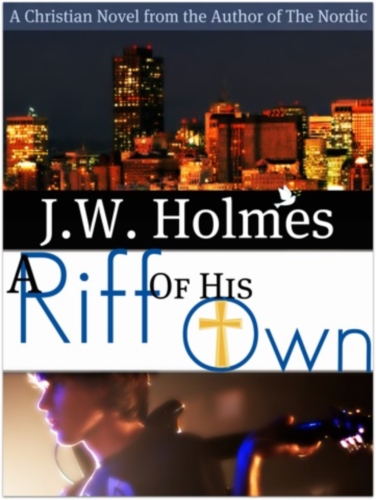 Jeff: Well, I’ve just released “A Riff of His Own” which is getting very good response. I’ve been running a number of promotions on it. I will be doing an audio version of it later this month for mp3 and the like. Here in a week or two will be releasing my initial book in the sci-fi series “The Nordic” which has also been decided to go into a comic-book format later this spring with the book series also continuing. In February, the first of the “Holy Moon” werewolf Trilogy will be released, waiting on mostly artwork there, and then in the spring will be the release of the of the first installment of the Paul Hawkinson mystery series. Right now, my main focuses are are simply on the Hawkinson mysteries, “The Nordic”, and “Holy Moon”.
Jeff: Well, I’ve just released “A Riff of His Own” which is getting very good response. I’ve been running a number of promotions on it. I will be doing an audio version of it later this month for mp3 and the like. Here in a week or two will be releasing my initial book in the sci-fi series “The Nordic” which has also been decided to go into a comic-book format later this spring with the book series also continuing. In February, the first of the “Holy Moon” werewolf Trilogy will be released, waiting on mostly artwork there, and then in the spring will be the release of the of the first installment of the Paul Hawkinson mystery series. Right now, my main focuses are are simply on the Hawkinson mysteries, “The Nordic”, and “Holy Moon”.
Chrys: Not only you write all these genres, you publish them too. Well done! Could you tell us more about your latest release?
Jeff: My latest release is Christian fiction, called “A Riff of His Own”. It’s about a young man branching out into the world but who has taken up with a very questionable group of underground types in the music scene and really gets more lost than he could have ever dreamed. So much so, the only back to anything remotely close to the life he knew before is through God. The real problem is, Billy, the main character, is so confused and unsure of himself at this later point, he doesn’t even know to ask God for help, so God comes to him through another person and the story goes on from there.
Chrys: If you weren’t a writer, what would you be?
Jeff: Hmm. Good question. Probably an astronomer or a marine biologist. I like the ocean, but I also am fascinated by the universe. I remember the first time I tried to get my head around just how big the universe actually was and just about had sparks coming out of my ears trying to compute it! lol It’s just limitless and for the ocean and the life living there, I think it’s so odd here it is 2012 and we virtually have explored something like only 5% of it. That to me just hardly makes sense in this day and age.
Chrys: What person or person(s) has/have helped you the most in your career?
Jeff: I would have to say indie author Penelope Fletcher has been an incredible influence on me, so has J.A. Konrath. Miss Fletcher was the first though to really reach out to me and help me truly get my nose in the self-publishing business and to take a good hard look at it really works. Self-publishing is way more of a business than many indie authors I think want to admit and Miss Fletcher really opened my eyes to that fact.
Chrys: What gave you the idea for your most recent book?
Jeff: “A Riff of His Own” had been in development for quite sometime actually. We always see films or books written about the terrible New York or L.A. scene but never much having to do the music scenes around Chicago or the mid-west, and that’s very much what “Riff” is about, only I remember seeing back in college up at Purdue when we had live music back in the ’90’s how these music acts really kind of lived in their own world and they chose to seal themselves up in this underground society most wouldn’t understand. I just remember one night thinking, ‘I should write about this’. So, I did.
Chrys: What is special about this book – what sets it apart?
Jeff: I think the main things that set “A Riff of His Own” apart from many other Christian fiction books is I wasn’t afraid to tell it how it really is. I’ve read enough Christian fiction, and maybe it was just the books I was reading, but I always saw how the author(s) were being careful not to offend or could have gone further. The problem is, you can’t get to the wonderful truth is you’re not going to face the terrible one. That meaning, things in real life do get quite awful sometimes and sometimes those people involved need incredible help and it can be ugly how bad off some get from very poor decisions. I kept the book very real for that point. The other thing that sets “Riff” apart is the fact it is based on several true story-lines that happen to these people in these underground groups all the time, so as you read and you’re thinking, ‘Something like this would never happen, nobody could be manipulative or lost…’, well, I can tell you, yes, they can. The key element in “Riff” is desperation and how differently some respond to that desperation. It can get quite ugly before family, or a good friend, or God Himself decides to intervene. Things have to play out.
Chrys: Do you have a favorite scene in the book?
Jeff: My favorite scene without a doubt is where, Billy, ponders on his life and is unable to explain to himself how he got there and what he’s still doing there, in such a rough and confusing place and why he doesn’t just leave. He reminds himself of his dream of making it and just gets sucked back into it all over again, begrudgingly, but he still goes back confusing his bad decisions for strength.
Chrys: What kind of research did you do for this story?
Jeff: Most of my research was done while spending time up on campus around Purdue University spending time with local acts and taking trips up to Chicago and interviewing some of the musicians up there and getting to know their climb to the stage. It really was shocking what some people will do to make their dreams come true and many stories I just couldn’t put in the book because of respect to the reader, I had remind myself this was a Christian fiction. lol
Chrys: Nice! 🙂 Jeff, where can people learn more about you and your writing?
Jeff: They can simply Google me for my official site as “J.W. Holmes”, find my blog at http://jwholmes.wordpress.com/ , on Facebook under “J.W. Holmes” as well as Goodreads, and on Twitter as @JWHolmes1.
My latest novel “A Riff of His Own” is found on Kindle.
An award for Rex Rising and the upcoming sequel
Hi boys, girls and androids! 🙂 Happy beginning of the week. Almost three weeks into 2012 and Rex Rising is doing well. The gang (Elei, Kalaes, Hera – for now) send their regards and wishes. 😀
Two big announcements regarding Rex Rising and the series (Elei’s Chronicles):
1) Rex Rising is in the Top Ten winners of the Preditors and Editors Readers Poll in the category for Science Fiction and Fantasy novels published in 2011 (click on the image below to see the final tallies)!
It officially got the position #6, which is really amazing to me. Amazing for a number of reasons:
– Because this is a novel I self published (the only self published one in the top ten!)
– Because it is a novel I wrote (me, not a native speaker of English!)
– Because I don’t even know who nominated Rex Rising for the poll (whoever you are, come out and let me give you a hug!)
– Because it’s my baby! 🙂
I am well aware that in this sort of polls much depends on how many friends you get to vote for you and less on how many readers you don’t know do vote – still, I’m ecstatic.
2) The sequel of Rex Rising, entitled “Rex Cresting” has been written and is now in revisions, so that the goal of releasing it end February is starting to look realistic! The cover is also in the works. So yay!
In all, these have been three good first weeks of the year. Happy 2012!
Guest Author Matt Posner
Today my guest is Matt Posner, author of YA fiction, including the wonderful School of Ages series.
Chrys: Hi dear Matt, and welcome to my blog! A pleasure to finally have a face-to-face with you (even virtually) after reading your School of Ages which was so wonderful. Why don’t you tell us a few words about yourself first?
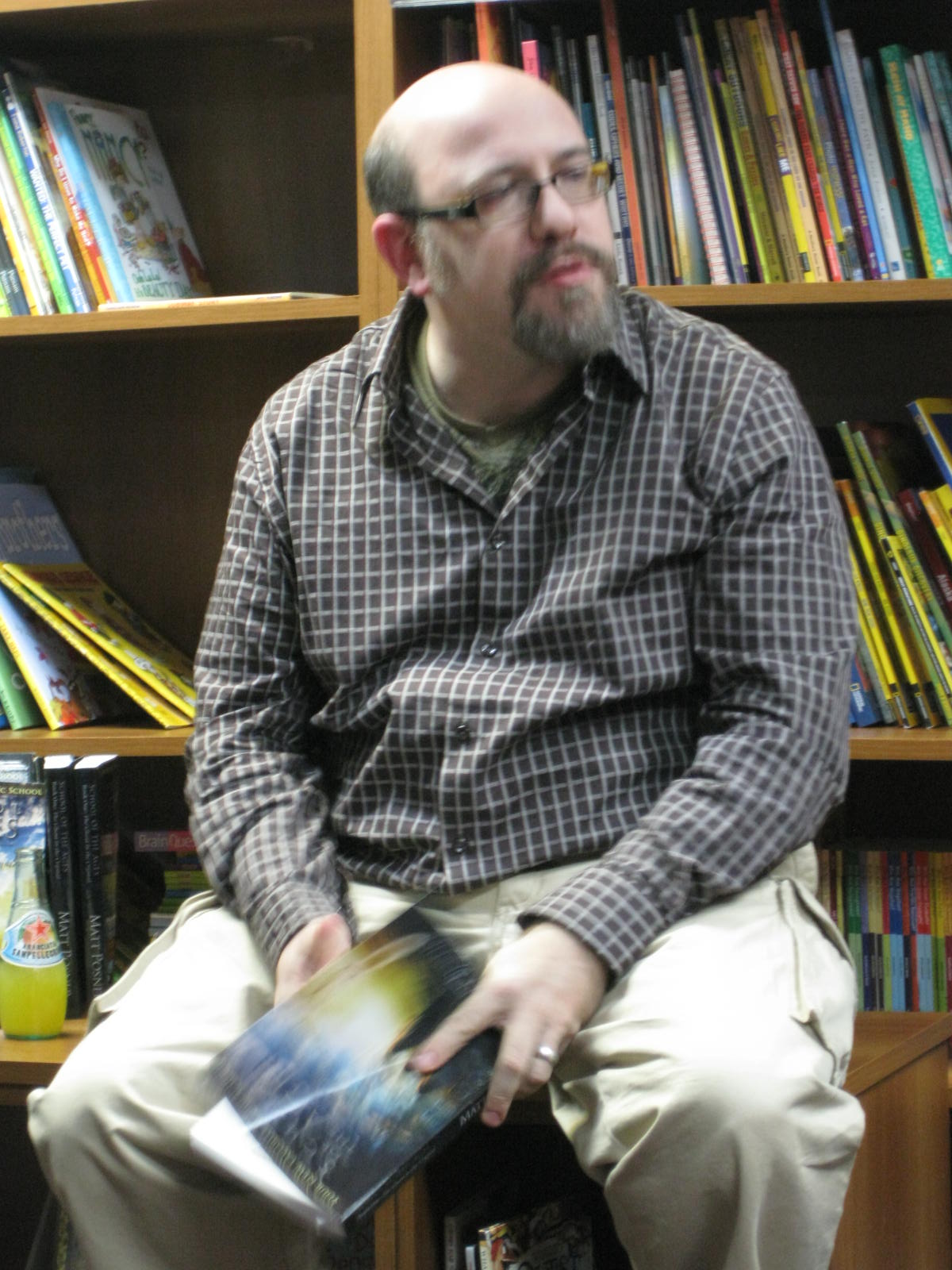 Matt: Hi Chrys. I’m Matt Posner, a New York City teacher and independent author. I’m also a poet, musician, architect, web designer, reiki healer, television producer, neurosurgeon, bandleader, cowboy, dinosaur rancher, arch-mage, trailblazing explorer, and…. Cough, cough. Well, I am also a poet and a musician. As a teacher, I work in special education English where I do what I can to care for those who are struggling or troubled. It’s a tough time to be a teacher here in the United States, with the major political agenda of most everyone being to show that teachers are directly responsible for student failure and seeking the means to dispose of our salaries and the institutions that have emplaced us. I hope it changes, because when it comes to paying the bills with book sales, I’m no Amanda Hocking….
Matt: Hi Chrys. I’m Matt Posner, a New York City teacher and independent author. I’m also a poet, musician, architect, web designer, reiki healer, television producer, neurosurgeon, bandleader, cowboy, dinosaur rancher, arch-mage, trailblazing explorer, and…. Cough, cough. Well, I am also a poet and a musician. As a teacher, I work in special education English where I do what I can to care for those who are struggling or troubled. It’s a tough time to be a teacher here in the United States, with the major political agenda of most everyone being to show that teachers are directly responsible for student failure and seeking the means to dispose of our salaries and the institutions that have emplaced us. I hope it changes, because when it comes to paying the bills with book sales, I’m no Amanda Hocking….
Chrys: Wow, first of all I’m impressed with all your activities, and I know I shouldn’t be, because reading your books one gets a glimpse of your wide range of interests. Sorry to hear that it’s hard being a teacher in the US. Here things aren’t so bad – maybe you should move to Cyprus? 🙂 Tell us, what genre(s) do you write and why?
Matt: I am writing primarily YA urban fantasy, with my School of the Ages series, because I enjoy writing about magic and teens. But I can write many other things. I’ve published recently in the fields of literary fiction, poetry, magic realism, action, and horror, and I’m working on nonfiction also. I don’t think writers need to be specialized or constrained to a niche. If I want to write something, I’ll write it and try to sell it. I’m a brand.
My motivation to write about magic goes back to my teenage years, when I read a lot of epic fantasy, ranging from Tolkien to Donaldson to Eddings. My earliest attempts at publication were in epic fantasy, such as the novel I sent to Del Rey Books when I was sixteen. (I’m pretty sure they considered it for a while before sending it back.) I made the shift to writing about magic in the real world when I began to sour on Tolkien’s legacy. I didn’t really want to read it or write it as much as I had used to – invented names instead of real-world names, maps full of trees and mountain ranges, all that stuff I had loved for years no longer felt right for me. This isn’t to say that I can’t dig something like Martin’s A Song of Ice and Fire or your Rex Rising series – of course good writing is good writing – but I wanted to work more in a research-based real-world vein. Originally I wanted to write about one adult magician teaching a few apprentices, but I expanded to a whole school because I was teaching in a yeshiva high school and I thought it would be cool to have a place that was half Jewish and half non-Jewish magic students who were sometimes friends and sometimes butted heads.
My stuff seems similar to Harry Potter, but rest assured, that’s not an advantage for me. I think buyers skip over me because they thing I’m some cut-rate Harry Potter imitator. I’m not. By the time my series is done, I intend to prove that I can write better than Rowling ever has. When my fifth book is out, I’ll challenge people to read both series and argue for which is better. But it’s not time for that yet; the third is due for this year. Want an ARC?
Chrys: I love epic fantasy and my first love was Tolkien as well. I do think that your world is very distinct from Harry Potter, much more mystical and with a lot more internal stuff going on. I’m not a big fan of Potter – but I loved your series! So, please tell us about your writing projects and recent releases!
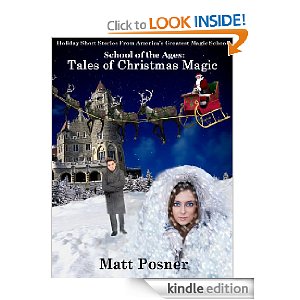 Matt: I just released Tales of Christmas Magic (click on the cover here on the left for the link!), a short story book exclusively for Kindle, which has a sample of Ghost in the Crystal. It features stories about my School of the Ages supporting characters in a lighter mode than the relatively intense novels. I hope this 99 cent book will attract people to my novels, The Ghost in the Crystal and Level Three’s Dream (which you reviewed). The cover story has Goldberry, a relatively posh and acid-tongued British girl with a heart of gold, get into a tussle with Christmas-themed entities on the school roof. Why would anyone enter combat against Santa? You have to read and find out.
Matt: I just released Tales of Christmas Magic (click on the cover here on the left for the link!), a short story book exclusively for Kindle, which has a sample of Ghost in the Crystal. It features stories about my School of the Ages supporting characters in a lighter mode than the relatively intense novels. I hope this 99 cent book will attract people to my novels, The Ghost in the Crystal and Level Three’s Dream (which you reviewed). The cover story has Goldberry, a relatively posh and acid-tongued British girl with a heart of gold, get into a tussle with Christmas-themed entities on the school roof. Why would anyone enter combat against Santa? You have to read and find out.
Chrys: What gave you the idea for this book?
Matt: I wanted to contribute to Creative Reviews’ Christmas Lites anthology, so I started “Goldberry vs. Santa Claus,” but I couldn’t meet their deadline, and I decided to release the story on my own. But I didn’t think one story would sell as well for 99 cents as several, so I wrote two more, and then I rounded out the book with a selection from The Ghost in the Crystal as well as the promotional comedy blog I wrote for Saffina Desforges and … one other thing. See below for that.
Chrys: What is special about this book – what sets it apart?
Matt: You have never seen so many elementals in one story as are in the story “How the Magician Radish did NOT Cheat on the PSAT,” nor have you ever seen Santa Claus and Father Christmas as separate character in the same story, as in “Goldberry vs. Santa Claus.” But besides all these things, I also put in a novelty item – my first fantasy short story, written while bored in Honors English when I was sixteen. It’s not as good as my present work, obviously, as twenty-six years lie between it and me, but I think it’s good enough to show some continuity between my present and my past; alternately, my high school buddies on Facebook can find out what I was really up to when I was supposed to be reading Huckleberry Finn. J
Chrys: Very interesting! Can’t wait to read it. 🙂 Do you have a favorite scene in the book?
Matt: In Tales of Christmas Magic, I like the bit in which Goldberry is riding on …er.. and she is being chased by … er… and then she decides to … er… Well, I can’t give it away.
Chrys: lol! Okay, fair enough. 🙂 What kind of research did you do for this story?
Matt: I do most of my research on the Internet. Most of my research is either locating historical names and facts or translating expressions into other languages. I do a lot of nonfiction reading usually in magazines, and it gives me ideas for things I can incorporate into fiction, and then I go to the www for peculiar details I may need.
Chrys: Thank you for telling us what goes on in an author’s mind! As a final request, can you give some advice to other authors?
Matt: Get a job in a moneymaking business. Writing is a labor of love.
Chrys: Thank you for being here! Where can people learn more about you and your writing?
Matt: My website is http://schooloftheages.webs.com which has a lot of links. I also have an Amazon author page, and my Goodreads author page also includes a lot of anthologies that I have been in.
What’s your heroine snacking on? (guest post by Krista D. Ball)
I feel bad for characters in my stories. They are under huge amounts of stress, their lives are constantly at risk, and they have to make difficult choices that never turn out well no matter what they do. The least I could do for them is give them a decent last supper.
In contemporary urban settings, food doesn’t seem all that important. Cities are filled with restaurants of every flavour, so there’s not much opportunity to use food to develop the mood and setting of a scene. That’s where science fiction and fantasy can really shine.
My novella, Spirits Rising, is set in the Canadian province of Newfoundland and Labrador. The island of Newfoundland only joined Canada in 1949, so there is still a strong sense of island identity. The island has been isolated from the world, sparsely populated, and for most of its history survived off the sea.
Since Spirits Rising takes place in a town of twenty people, I was able to use those traditional Newfoundland foods that might have been missed in an urban setting. My heroine eats Jig’s Dinner, a traditional Newfoundland meal of salt pickled beef, cabbage, potatoes, carrots, turnips, and pease pudding all boiled in the same pot. She chomps down on molasses cookies, a local favourite, and drinks Newfie Screech, a potent rum concoction.
In my science fiction novel, Road to Hell, I used food as a tool to show how bad things really were. The military officers belonging Perdition lived exclusively off field rations and packaged food, leaving what little fresh food was left after an attack for the civilian population living at the port station.
I love the concept of Star Trek’s food replicators, but I also believe they aren’t possible (or, at least not possible in my SF world). Instead, I developed a quasi-food vending machine for individuals in their rooms. A person could get banana bread and a coffee from their wall panel vending machine, freshly baked reconstituted soy protein. Yum.
I’d find it difficult to write in a typical setting with the standard meal fare being offered. I love to use food as part of the story. For me, it is its own minor character.
Interview with author Kelly Jennings
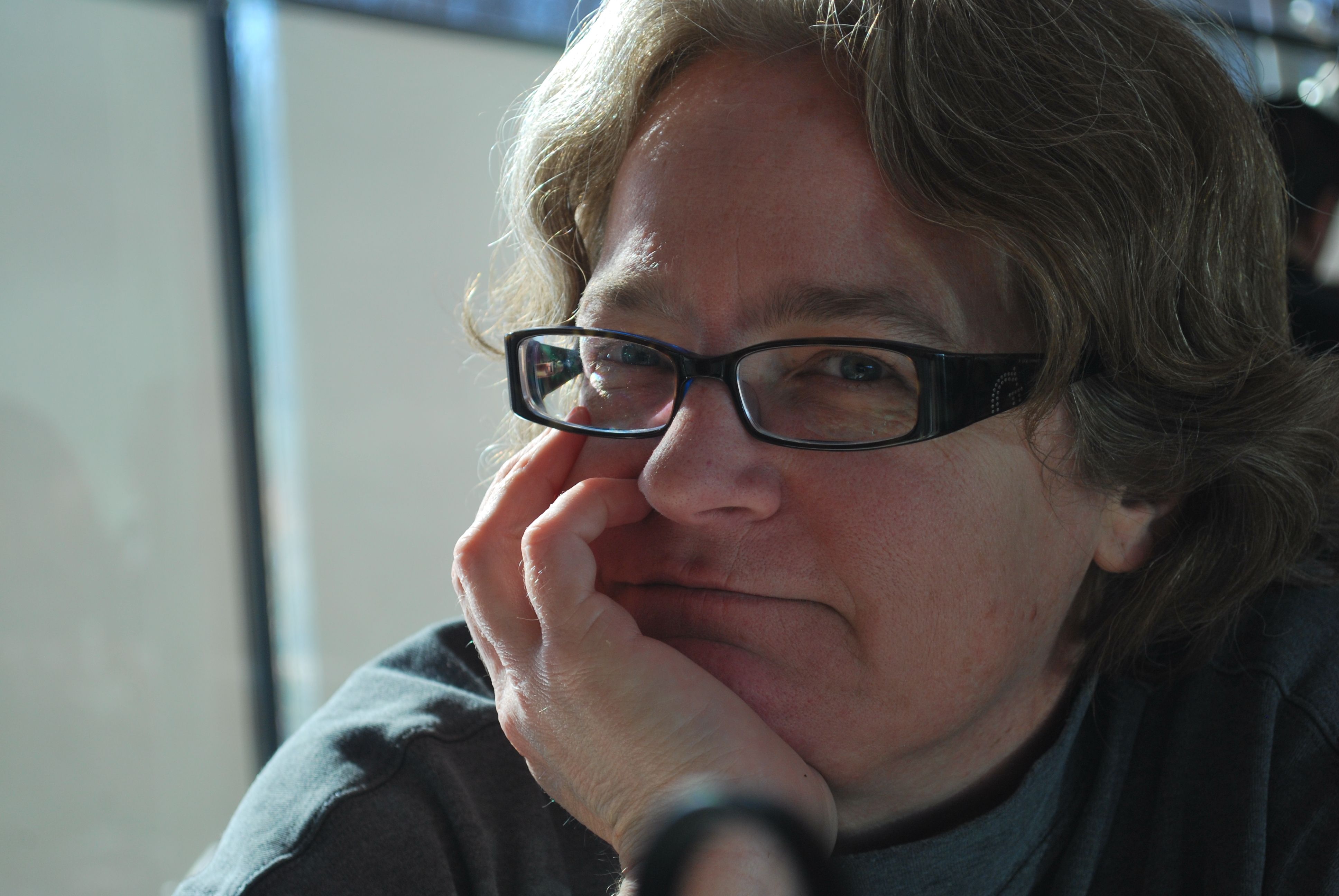 Today I am very excited because my guest is an author whose book Broken Slate (mature YA SF) I loved – welcome Kelly Jennings!
Today I am very excited because my guest is an author whose book Broken Slate (mature YA SF) I loved – welcome Kelly Jennings!
Chrystalla: Hi and welcome to my blog! Why don’t you tell us a few words about yourself first?
Kelly: I’m a writer and teacher in Northwest Arkansas. I’ve traveled the country, teaching and writing, camping and hiking. I like to walk around in mountains. I like to look at rocks. I’ve got two dogs, a cat, a husband, and a kid. We’re all writers, (the humans are all writers!), which makes for a quiet if occasionally grumpy household. You don’t want to be around here when we all have writer’s block.
Chrystalla: What genre(s) do you write and why?
I spent a lot of time thinking I had to write literary fiction if I wanted to be a real writer. But finally I came to my senses. A writer can only write the writer’s own stories. I write science fiction because that’s the writing I love. I read nearly everything, and I love a lot of different kinds of books, but the only books and stories I want to write – care deeply about writing – are science fiction stories.
Chrystalla: So true! I do believe also that one should write what one loves, not what one must. 🙂 What can you tell us about your writing projects and recent releases?
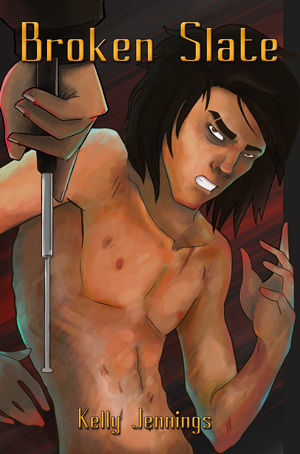 Kelly: My latest novel – oh, okay, my only published novel so far – is Broken Slate. It’s meant to be a prequel in the series I am calling Martin’s War.
Kelly: My latest novel – oh, okay, my only published novel so far – is Broken Slate. It’s meant to be a prequel in the series I am calling Martin’s War.
I plan five books in the Martin’s War series – Triple Junction, the opening book, is nearly finished; On Through the Night is in its first draft. Riding The Scree and The Drift are the third and fourth books; I have only vague plans for the final book in the series at this point. Altogether, these books will track the story of a slave revolt leading to a Revolution on Julian, a planet 43 jump points from Earth.
Broken Slate introduces the main character, Martin Eduardo, and the culture of Julian just before the Revolution. Among other things, in this book, I attempt to answer a question that sometimes seems so mystifying from this end of history – why don’t slaves rebel? Why don’t the oppressed rise up? Why did the Jews walk into the camps? That question. Obviously the oppressed outnumber their oppressors, sometimes enormously so. Why go down so meekly?
The actual answer, as I’ve found through research, is that the oppressed did not go down meekly. The history we get taught in school and the true history (and I know, hah, what a shock) are often yards apart. The Jews didn’t walk into the camps – there was lots of resistance, and lots of it was successful resistance. The American slaves didn’t accept their fate. Everyone knows about Nat Turner, and I suppose plenty of people even know about Haiti now, but who knows about Gaspar Yanga? Or Zumbi Dos Palmares? Even the unsuccessful resistance is important: it demonstrates that the narrative of the meek victims is a convenient fable.
On the other hand, it is true that resistance is difficult. What makes it difficult is what I explore in Broken Slate. How is it that a relatively small group of oppressors (the famed 1%) can control a large group of oppressed? (We are many, they are few, Shelley famously pointed out, so how do they keep us under the boots so successfully?) In Broken Slate, through Martin’s eyes, I look at that question; and also at how the oppressed can come to resistance.
Other writing projects – ha, well: My kid asked me recently, “Why is everything you write about the revolution?” “Shut up, that’s why,” I told her.
I’m afraid that it is the truth. I’ve got a story coming out with Strange Horizons, “In the Cold,” in January. It looks like it’s not about the revolution, but of course it is. And I’m working on another short story right now, “Buddha’s Wings,” for an Arkansas anthology, which I thought wasn’t going about the revolution; but yeah. It’s about the revolution too.
Chrystalla: I just loved Broken Slate so much, I hope you will continue writing about that revolution at least! Can you give us an excerpt from your latest release?
Kelly: This is from Broken Slate: Martin is riding home on a monorail in the contract labor car, listening to the other contract laborers telling stories.
“Outside, the contracts were telling stories – the sorts of stories that did get told whenever cots got together, low-voiced, muted: a half dozen field cots had run from an estate in the West Country timber yards, been caught by Labor Security helos and though they had fought – they had armed themselves with thieved cutters, retooled so that they would fire short bursts, an inept kind of plasma gun, risky, but better than nothing: every cot knew how to do that to a cutter, much good it did them, since Security had to get with a few meters for that weapon to be useful – been captured, three of them still alive, and dragged back to their estate, where, as was the usual practice, the runaways were put on their knees by the flagpole, shot in the back of the head, and their bodies burned.
After that a cook told another story, about a cook she had heard of, in the Bragg Mountains, who had slipped a poison in the food of her holder’s family, killed all of them, four children, holder, holder’s wife, that fast, the physician didn’t have time to arrive. “It was because the holder had been raping her,” the cook said, “every night, that’s what I hear. Labor Security came in on helos, but before they could tank her, or even get hold of her, Lord Holders in the town got her.” The cook paused dramatically.
Martin didn’t really need to hear how this story ended. The rest of the truck was waiting, though, their eyes wide.
“Didn’t bother shooting her. Dragged her through the town,” the cook said. “Yelling names at her, howling. Poured the coal oil over her and set her alight still alive.”
Gasps and curses through the truck.
“After, they tore her body apart and carried bits away. That’s what I heard.”
Other contracts had other stories, this contract attacking his boss in the field, this holder and what had happened here. Martin didn’t exactly want to listen, but it was hard not to. Only a few stories got told about those who made to the mountains and might be mounting a resistance. Martin never knew whether to believe in these contracts or not. Certainly Julian Security acted like they were actually up there. Certainly the few times Deja had taken him along to the Julian Parliament, Parliament acted as though the Contract Revolution was real. But Martin knew better than anyone how paranoid and delusional Republic politics could be.”
Chrystalla: What gave you the idea for this book?
Kelly: Ooh, good question. Looking back, I see three real seeds. One was reading C.L.R. James’ The Black Jacobians. This is just a great book, the story of the slave revolt in Haiti. It’s wonderfully written, for one thing, and it gave me an understanding of history like no other book I’ve ever read has done. I kept thinking as I read this, wow, this would make a great novel. So that was one bit.
Another was, back in 2003/2004, all over the internet, Far-Right blogs, guys that are eventually going to become Tea-Party members, were arguing about the For-Profit Prisons being built in Texas and Arizona. I keep reading comments about how prisoners ought to be rented out, how they ought to have to work for their food and board. This is during one of the biggest expansions of prisons in our history, mind you, people being sent to prison for ten years or twenty years because they’re smoking crack, not because of any violent crime they’ve done.
And then I read Douglas Blackmon’s Slavery by Another Name, which is about how the South kept the system of slavery going by work farms and prison farms – by convicting black men and women for ridiculous crimes or no crimes at all, the crime of vagrancy or back talk or nothing, just some white guy saying this black guy had committed a crime, and then the black guy would be sentenced to twenty years and rented to a mine or a road crew and worked to death – and bam, there it was. I started writing.
Chrystalla: What is special about this book for you – what sets it apart?
Kelly: When I started writing, I said what would be special about this book was that it would be the story of a successful slave revolt. Now I know that’s not so, that many of them succeeded. Maybe I’m bringing that point to the forefront, for one thing.
Another difference, though, is that this narrative, this revolution, comes from the point of view of the oppressed, the slaves themselves. My main character, Martin, was a deckhand as a kid – he had his first job at age six – and has been a miner and a quarry worker. In Broken Slate, a number of aristocratic characters play significant roles; in later books, as we move further into the revolt, the slaves will be even more prominent.
Another difference: my main character, Martin, is a bisexual; on Julian, that’s not a big deal.
On Julian, sexual taboos have to do with class. For anyone who is not a wealthy property owner and a legal citizen, sex is legally restricted. Children are not citizens, so they are restricted from access to sex. Contract labor are not citizens. Both free labor and Service class are citizens; they are allowed sex, but this gets complicated: free labor and Service class are meant to have sex only insofar as they can legally support the products (children) of their sexually activity. So there’s a whole category of legal (and moral) code on Julian having to do with illegal sex. Having sex before you’re an adult is illegal sex, which will get you convicted into contract labor; having more children than you can support will get you, and your children, convicted into contract labor.
So being gay is perfectly okay, both for Lord Holders and for cots like Martin. It’s being poor and having babies that’s a crime – literally, and morally. (Rich people get to have all the babies they want, obviously.)
Chrystalla: Amazing, all the research, and we the readers see the tip of the iceberg as it were. But it also explains why we are able to immerse ourselves so completely in your world, you really created it in so much detail. Tell us, do you have a favorite scene in the book?
Kelly: Good question! I have several. One I really like, though, is a scene in which Martin is shoveling snow in the Bourbon Mountains. He’s gone with his contract holder, Deja Lord Strauss, to do research at a university there, but a giant blizzard snows them in. Anyway, he’s shoveling snow and he talks to two contract labor kids, boys about 12 years old, kids who have come up in an orphanage, and don’t really know anything about how to act. We get to see Martin being a leader and a teacher for the first time – it’s a foreshadowing of a role he’s going to take on in later books.
Chrystalla: What kind of research did you do for this story?
Kelly: Tons. Endless research. I’m still doing it. I had to build not just Julian, but the worlds Julian came from, and the Pirian culture and the Free Merchant culture Martin came from, and the culture all of these cultures came from – the notion is that some disaster happens a couple hundred years from now which renders all of the Earth uninhabitable except for Oceania, over there by Australia, New Zealand, the Philippines, maybe Malaysia, maybe Japan, some of India. And so these are the areas that survive to launch into space (some handwaving here) and colonize the Core planets.
Lots of my research, then, is into what sorts of food, what language, what mythic backgrounds, would come with the people who go outward into space. It’s been 1500 years, so I’m assuming lots of cultural blending; also I’m assuming refugees from other places on the planet did reach the inhabited zone; also, I’m assuming Earth does recover, eventually.
Other research was into slave revolts, slave cultures, slave narratives, resistance narratives, histories of revolutions, of resistance, of guerilla wars, about tactics – I used to joke that probably Homeland Security has a file on me, just from my Google Searches and Interlibrary loans alone.
Linguistic research: I want the dialects to work. Obviously we’re going to have several different dialects and levels of dialects on Julian, and that’s before we bring the Pirians onto the planet, as we do in Triple Junction. So we’ve got the different dialects spoken by the different Lord Holders – your East Country holder, your Far North County Holder, your University of Durbin Holder, so on – and then you have your Service class diction, and your free labor speaker, and your field cot dialect and your North Country miner contract: they all speak different dialects. I’m not sure I succeed in demonstrating this in the books, but I’m working at it.
Chrystalla: I must say, all this makes me so impatient to read the next book in the series! I do hope it will be released soon! Kelly, what advice do you have for other authors?
Kelly: Write what you care about. Read what you write about – and read everything else, too, certainly. Read everything you can get your hands on. Read bad fiction as well as good fiction – the bad stuff can teach you more than the good stuff, sometimes. Read non-fiction as well as fiction. Listen to fiction as well as reading it.
Write every day. Write a lot – at least 1000 words a day, more if you can. (I can’t, usually.) Revise, revise, revise. Send your writing out. Submit, submit, submit (your writing – don’t submit to the oppressors!). You’ll get rejected, but that’s part of the job. Send it out again. Join a writers’ group if you can. I currently belong to an excellent group; we meet once a month. They’re so wonderful I can’t tell you.
Chrystalla: Thank you for being here today! Where can people learn more about you and your writing (links)?
Kelly: I have a blog (http://delagar.blogspot.com/) and a group blog (http://www.fansci.org/). Read more there!
Get Kelly’s book “Broken Slate” here – links to all retailers.
Akrotiri – where the flamingos go in winter
Just because not everything in my life is about writing and stories (although about 80% is!) today I will show you a part of Cyprus that is quite new to me: a wetland.
Cyprus is arid as a desert. What water falls here in Winter is collected in dams to keep for summer. But we have some wetlands too with brackish water (those not drained by the British to fight malaria in the 19th-20th centuries) and there lots of birds live or pass by on their migratory trip to other countries.
It’s muddy and many people think they can throw their trash there because hey, nobody lives there! Amazing how people are…
Water stretches in glass like surfaces, mirroring the sky and reeds. It’s peaceful and beautiful.
Shards of glass meld with the water.
And then evening falls and it all turns to gold.
Welcome to Cyprus. 🙂
Join my mailing list!
If you want to be informed right away when a new release is available, you can subscribe to my mailing list.
I will only use it when I release something new, and I promise I won’t clutter your inbox or share your e-mail with anyone else.


